As Someone Who Cooks Professionally In His Tiny Kitchen, These 10 Little Tips Have Changed My Life (And Even If You Have A "Normal-Sized" Kitchen, It's Advice Worth Taking)
Hey, folks! I'm Ross, and my life is...pretty much all about food. In addition to covering all things food-related for BuzzFeed, I'm also a recipe developer (and I also style and shoot most of the recipes I create). Pepper in the fact that I cook meals for myself and my partner every day, and we've arrived at the fact that cooking basically dictates my life — and I love it! The catch? I make it all happen in this teeny tiny kitchen.
Ross Yoder
For a New York City rental, things could actually be a lot worse. I have some counter space and a full-size fridge, so I honestly consider myself lucky. But for someone who loves to cook (and does it professionally), it's far from ideal.
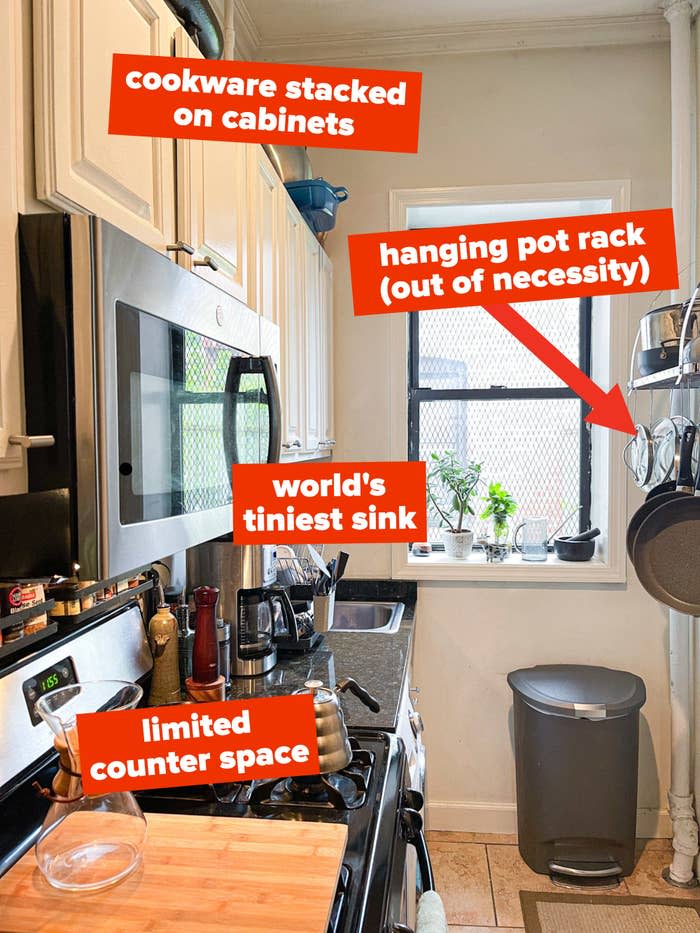
Over the years, I've tweaked a lot of things here and there, and I've gotta say...I've grown to really enjoy cooking in my small kitchen. The techniques and habits I've adopted (in addition to some cost-effective "upgrades") have made my workspace totally usable, and I've actually grown to — dare I say — appreciate the fact that I can pretty much stand in the same place and do everything I need to do.
These are my best tips for anyone trying to make most of their small kitchen, whether they're an avid home cook or don't get in the kitchen all that much. (And psst, if your kitchen isn't as pint-sized as mine, I'm pretty sure you'll also find some advice in here to implement, too.)
🍳 TIP #1: If there's one constant in this wild thing we call life, it's that Tupperware and food storage containers can easily take up an entire cabinet (if not two). Minimize the chokehold that Tupperware has on your life by investing in simple deli containers, and you'll also eliminate the stress of mismatched lids and misplaced containers for good.
Since I'm constantly cooking, I'm also constantly working through a never-ending cycle of leftovers. Don't get me wrong, it's an incredible perk! But there have been days when I feel like throwing every storage container with a missing lid STRAIGHT out of my window, and I know I'm not the only one who's felt this way. Replacing all my traditional food storage containers with cost-effective deli containers was a 10/10 decision, and I'm strongly encouraging anyone that feels like they're drowning in an avalanche of mismatched containers to do the same.
I could write an essay on exactly why I love deli containers so much, but for me, it boils down to three distinct reasons: they're cheap, all the lids match (!!!), and since they're easy to stack and narrower than most other pieces of tupperware, they also take up significantly less cabinet space.
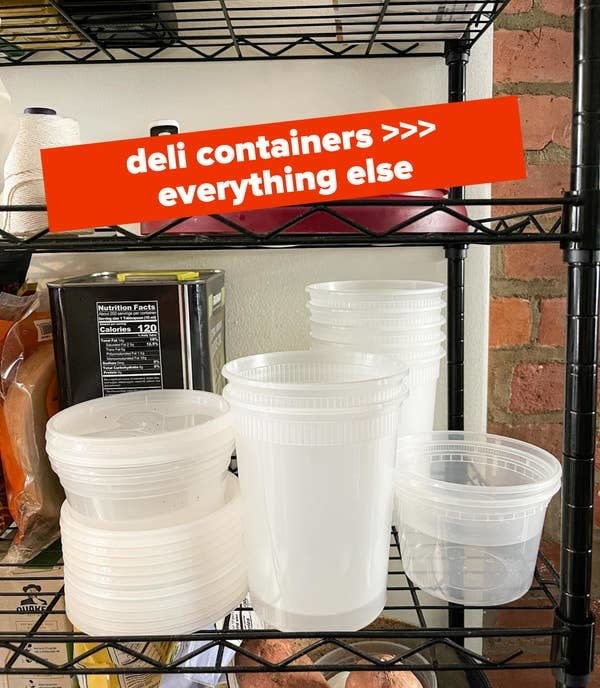
Since they come at a super affordable price point, I love that I can send guests home with leftovers in a container that I literally do not need them to bring back. If you have somewhere to store extras, you can buy 'em in bulk for around $.25 a container, but even if you purchase them in smaller quantities, most containers come out to less than $1. So, no, when I send you home with extra pasta after a dinner party, there's no need for me to feel any guilt over the fact that I just loaned out a pricey container, so keep it! Reuse it, lose it entirely, or toss it. I do not care. 😌

🍳 TIP #2: Divorce yourself from the idea that your kitchen has to look like it was ripped straight out of the latest issue of Architectural Digest. If you're working with a smaller kitchen than you'd prefer, it's all about function over aesthetic.
OK, look, we all want a designer kitchen. In my designer kitchen, I want solid wood cabinets, quartz countertops, a massive island that all my friends can gather around while I cook for them, and built-in appliances as far as the eye can see. At this rate, I'll...probably never have that. What I do have are white landlord-chic cabinets that are too narrow to store most things, a sink that's not even wide enough to hold a dinner plate, food-stained walls in lieu of any sort of tile backsplash, and an oven that runs about 50º cooler than it should. But, it's mine — and I've made it as functional as humanly possible, even if it's meant clumsily piling lesser-used, larger items on top of my cabinets.
As someone who's always looking for a project, I'm constantly reminding myself that any "upgrades" I make to my kitchen have to be function-first. If they happen to be functional and aesthetically-pleasing, great! But the fact of the matter is, I'm more miserable when my cooking space isn't functional than I am happy when I implement something purely for aesthetics.
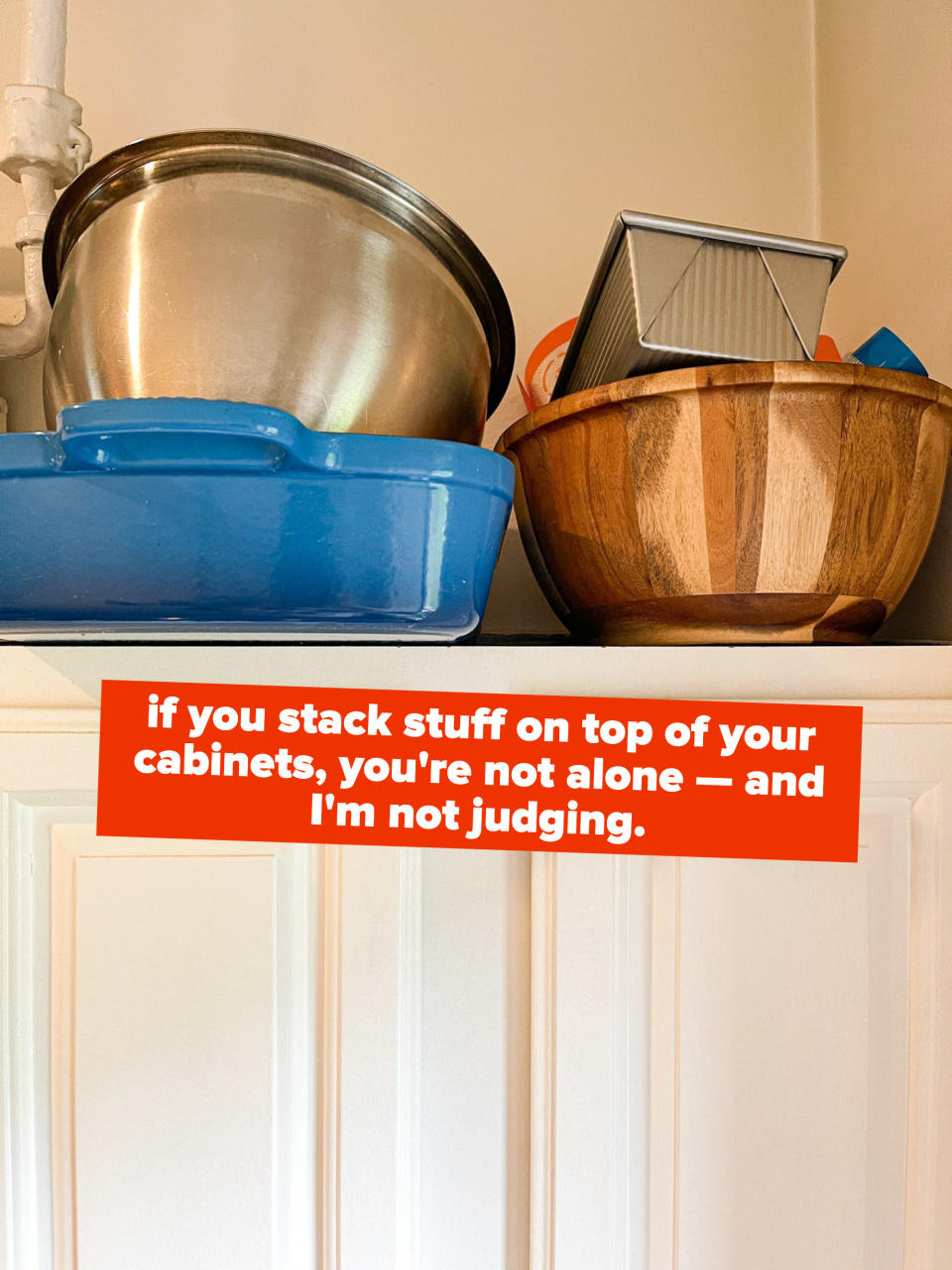
Whether you cook for a living or just prepare meals every now and then for your family, kitchens are primarily a working space. Your kitchen's #1 job is to work for you and make the process of preparing meals to nourish your body (and soul) a little bit easier. Lean into practicality and you'll have a much better time cooking, whether you're getting smart about storage, utilizing commonly forgotten-about space, or investing in furniture to give yourself a little more space to work with — all of which we'll get into a little later.
🍳 TIP #3: Be selective with your small appliances, and opt for multi-functional products over single-purpose ones whenever you possibly can.
As human beings, we tend to accumulate a lot of stuff. Some of it's genuinely helpful, but most of it just takes up space. Before you invest in new appliances (whether they're as tiny as personal blenders or as large as an air fryer), do some research and comb through reviews to make sure you're purchasing equipment that can serve multiple purposes. In doing so, you'll lessen the amount of stuff you're hanging on to while staying just as capable.
The best example of this? The Instant Pot. I mean, they literally advertise the thing as being able to perform a zillion functions, but in my case, it takes the place of a few small appliances that would be a total nightmare to store otherwise: a pressure cooker, a slow cooker, and a rice cooker. When I'm done with my task, it neatly stores away as only one item — and for that, I'm eternally grateful.
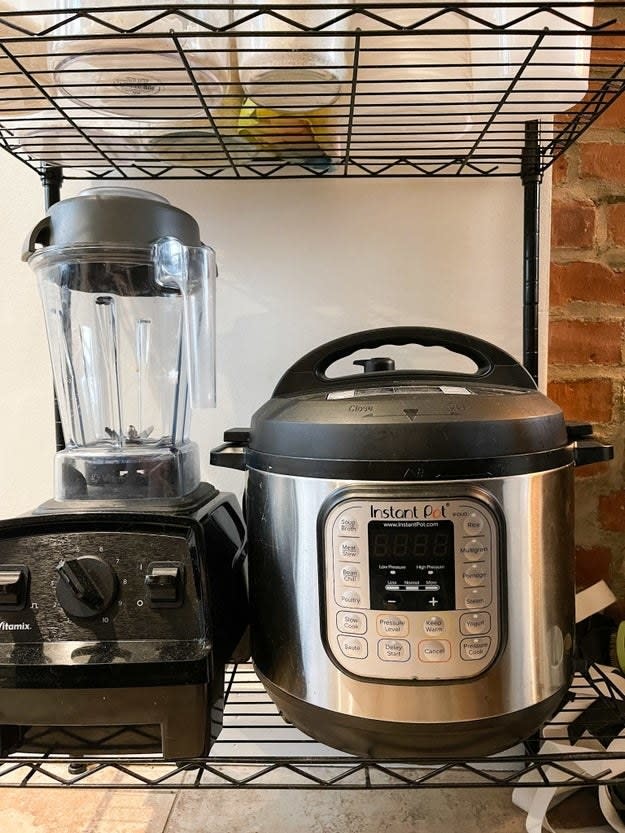
I also feel the exact same way about my "air fryer." When researching the vast array of options out there, the most important element to me was that it served as more than just a single-purpose appliance, so I opted for one that fries, toasts, and is even large enough to bake sheet pan meals or baked goods when I don't feel like turning on my actual oven. It's not a tiny appliance by any means, but its multi-functional nature and size mean that I actually keep it out on my counter — it sounds counterintuitive when you have limited counter space to begin with, but the visual cue of seeing it out actually nudges me to use it more often, unlike some of the smaller items that collect their fair share of dust in my cabinets.
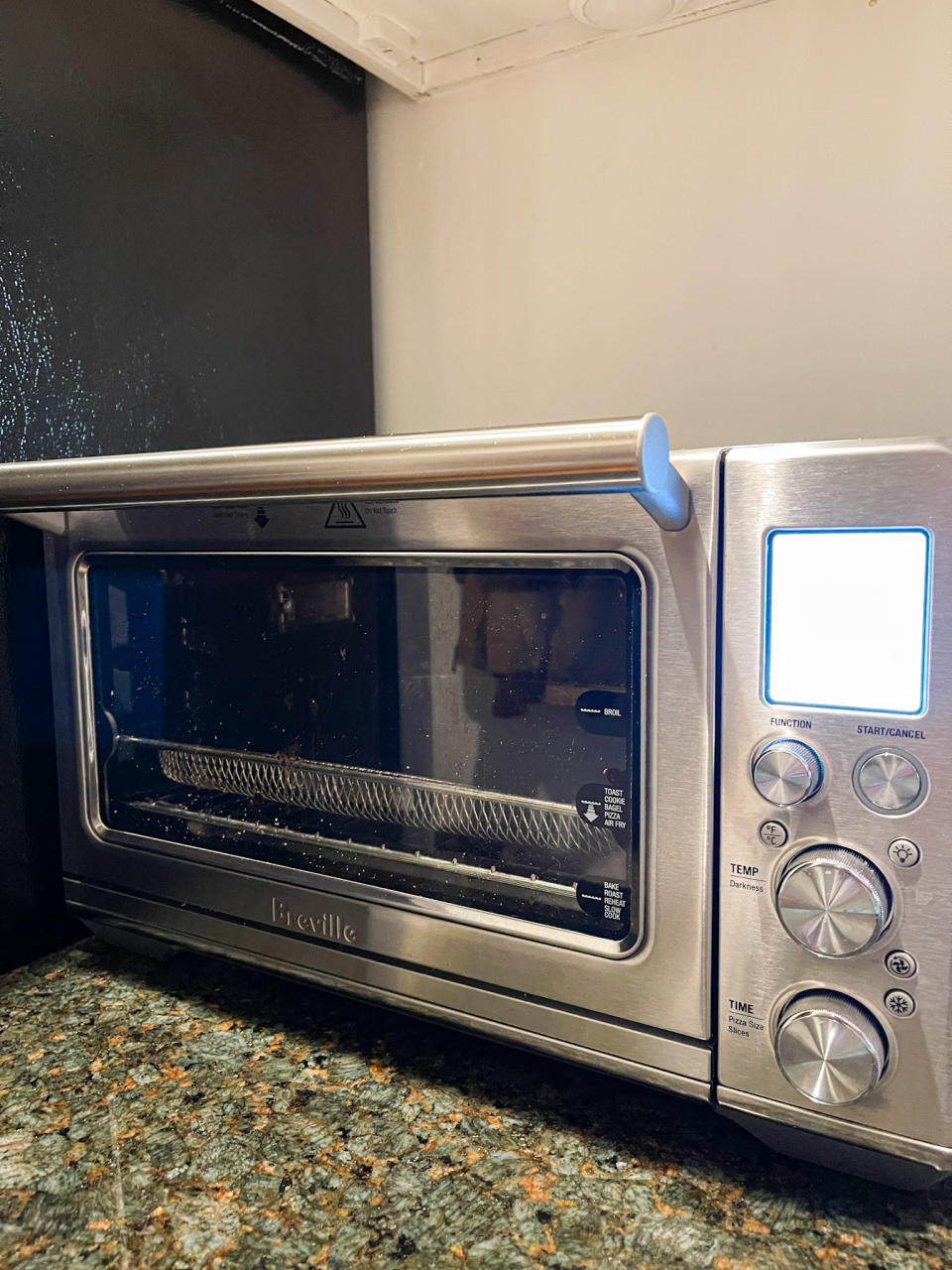
🍳 TIP #4: Stoves are massive. Since you're probably never using more than two burners at a time, use a burner cover for a little bit of extra (and very usable) counter space.
When I think about the footprint of my stove in comparison to the amount of actual counter space I have available, it can make my head spin. So if you, like me, have a massive gas range that you never use all the burners of simultaneously, a burner cover can be a small but massively helpful investment.
Confession: My "burner cover" is...actually just a bamboo cutting board that I sized to fit over half of my burners, and even without spending money on a more tailor-fit solution, it's been a game changer. There's nothing fancy about this hack — it merely functions as extra counter space when you need it, and stows away easily when you're in need of an extra burner. And TBH, I think it looks pretty darn good, too. (Very ~professional~, you know?)

🍳 TIP #5: Your kitchen cabinets can either become your best friend or your arch nemesis. Make them actually work for you by getting strategic with the cabinet space you already have.
I'm giving you a quick assignment. Go to your kitchen, open up your cabinets, and tell me how much empty space you see. Unless you're a professional organizer, you probably have a lot of unused space in your cabinets — and if you do, I promise you're not alone. The problem with most kitchen cabinets is that they're one-size-fits-all, especially if you're in a rental, so it takes a little bit of strategizing to make sure you're optimizing all the cabinet space you have available to you.
Use prioritization to decide what goes where. Start with your largest and most-used items and make your way to your smallest and least-used items. At the end of the day, you want easy access to the biggest, most cumbersome items, or the equipment you use daily — like dinner plates and mixing bowls. Smaller objects, like drinking glasses, mugs, and utensils, are easier to store in the space you have remaining, and when there's an overall hierarchy to the way you store things, cooking will be a far less stressful experience overall.

If you're still running low on cabinet space, invest in some budget-friendly shelf organization racks that can effectively double the amount of space you have. I use these inexpensive racks to double up on plate and drinking glass storage, and since I have plenty of mismatched dinnerware for food styling purposes, it gives me twice as much space to store them and makes finding that one item I'm looking for a little less nightmarish.
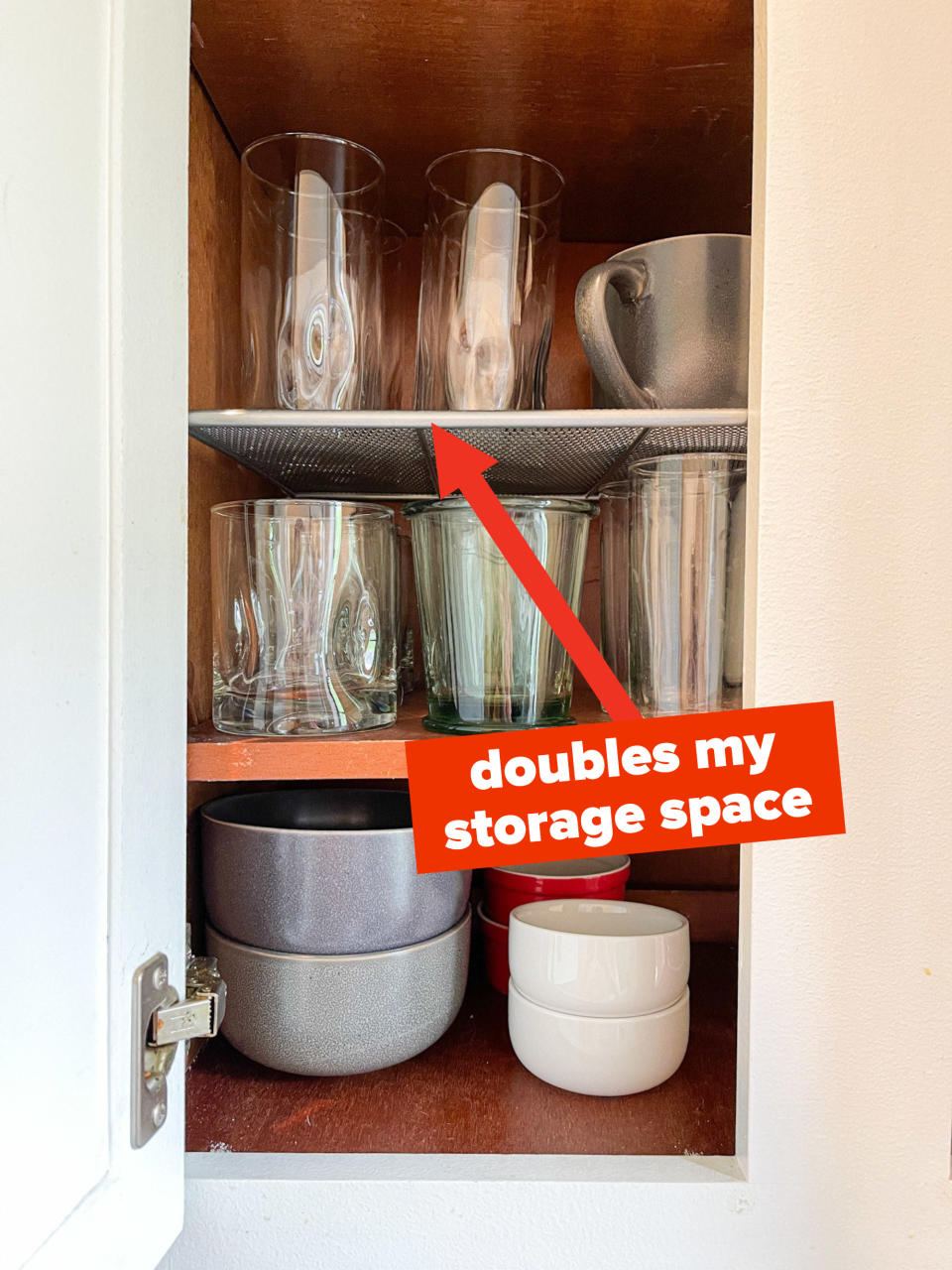
🍳 TIP #6: Make "clean up your first mess before you create a second one" your new mantra. Also, since it can't be overstated: CLEAN UP AS YOU GO.
I'm not including this tip to be patronizing or to suggest that working in a pristine, neat kitchen is the only way to be a successful home cook — I'm including this one because as soon as I started to prioritize tidying up my messes while I made new ones, the mere act of cooking became a lot less stressful, and I don't think that's a coincidence.
Mess and clutter are scientifically-proven to increase cortisol levels, also known as the stress hormone. Therefore, it's really no surprise that cooking in a tiny kitchen can be an anxiety-inducing experience for many. In a large kitchen, there's room for mess. If you want to pretend that you didn't just use every single piece of kitchen equipment you own by stashing things in a corner until you're ready to deal with them, you probably can — but in a small kitchen, you're constantly reminded of the chaos you've created for yourself. Fun, huh? Luckily, you'll have bits of downtime here and there when preparing most recipes, and in those moments of nothingness, the absolute best habit you could get into is getting a head start on tidying up. As someone who cooks daily, I've found that it's the single most effective method for reducing stress.

Another good habit that's been essential in keeping my kitchen as stress-free as possible is cleaning up my first mess before creating a second one. It sounds obvious, I know, but it's an easy problem to have — especially when you're dealing with limited space. I'm constantly having to remind myself to put away those clean dishes or scrub that skillet that's been soaking since last night's dinner before diving into a new project, and while it's a habit I'm still trying to get the hang of, it's already simplified my workflow more than I expected it to. Gone are the days of playing a real-life game of Tetris when stacking newly-cleaned dishes on top of dried ones, and I'm a much better, more relaxed cook as a result.
Ross Yoder
🍳 TIP #7: Do a yearly "audit" of all your kitchen equipment, from cooking utensils to tupperware and even your larger pieces of cookware. Then, get very real with yourself about what you actually use and what you don't.
Marie Kondo taught us that we can improve our lives by discarding items that no longer "spark joy" for us. Similarly, I'm here to teach you that you can drastically improve your small kitchen by getting rid of the items you literally forgot you owned. When you say to yourself "I fully forgot that I even had this," and I promise it'll happen more than you'd expect, that's your sign to donate or toss it for good.
Our cabinets, drawers, and pantries can easily become stacked with excess tools (and even food!) that we completely forget about, so setting aside some time to actually look at all the stuff you own, and only keep the items you use regularly, can seriously streamline your space. I do this once a year, and I'm always shocked at the amount of stuff I find sitting unused and out of sight. This year, it was two bread bannetons (straight from my 2020 sourdough days, IYKYK), a cast iron tortilla press from the one time I made homemade corn tortillas, and four separate silicone pastry brushes...and TBH, I've hardly ever used one. Straight to the donation pile.

🍳 TIP #8: Contrary to popular belief, don't be afraid of adding more furniture to your already tiny space (as long as it's actually making the process of cooking easier for you).
TBH, my life changed for the better when I bought a bulky (but wonderful) wire storage rack to use as a makeshift "pantry" of sorts. Before, I was somehow making do with three shelves in a singular, tiny cabinet. Is it ugly? Absolutely! Would I be totally lost and helpless without it? You betcha.
When it comes to interior design, it's commonly believed that adding more furniture to a given space makes it look (and feel) smaller and cramped. I'm not refuting that by any means — "more" does not always equal "better" — but when it comes to your kitchen, I'm giving you blanket permission to fill your space with as many additional items as you need to make cooking easier for you.
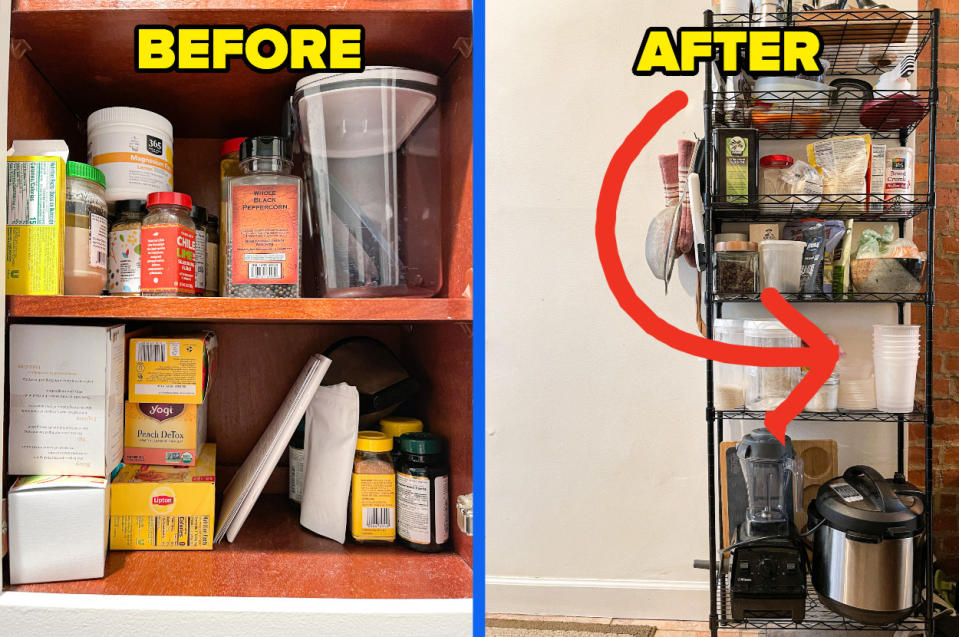
Here's my rule of thumb: As long as you can navigate around these objects and they're not immediately in the way of anything crucial to the cooking process (i.e. blocking an oven or refrigerator door), they're worth having. In my case, it was a giant wire rack, but for you, it could be a portable kitchen island to expand your counter space and storage. The weird blessing of a tiny kitchen is that your guests won't crowd around you while you cook (as is common in larger spaces), so as long as you're not tripping over items left and right, this is one circumstance where "more" could very well mean "better."
🍳 TIP #9: Use empty wall space to your advantage. By doing so, you'll save your cabinet space for other necessary items, and you'll also keep the equipment you use regularly within arm's reach.
We rarely make use of our wall space for anything other than decor. When it comes to the kitchen, specifically, utilizing those empty walls for practical purposes can give you a ton of extra space — and if you do things right, you may very well improve your overall workflow, too.
When I first moved into my apartment and realized there wasn't a single cabinet large enough to store my myriad pots and pans, I panicked. After doing some digging online, I found a plethora of wall-mounted pot hangers and decided to give one a try. Nearly three years later, I'm thrilled to report that my kitchen would be a nightmare to cook in without one of these, and I'm grateful for it every single day. These things are function at their finest — sure, it's not the prettiest thing to look at every day, but it keeps my hard-to-store items organized and easily accessible and totally eliminates the process of needing to un-stack and re-stack every pan you own to get to the specific one you need. That, my friends, is worth its weight in gold.
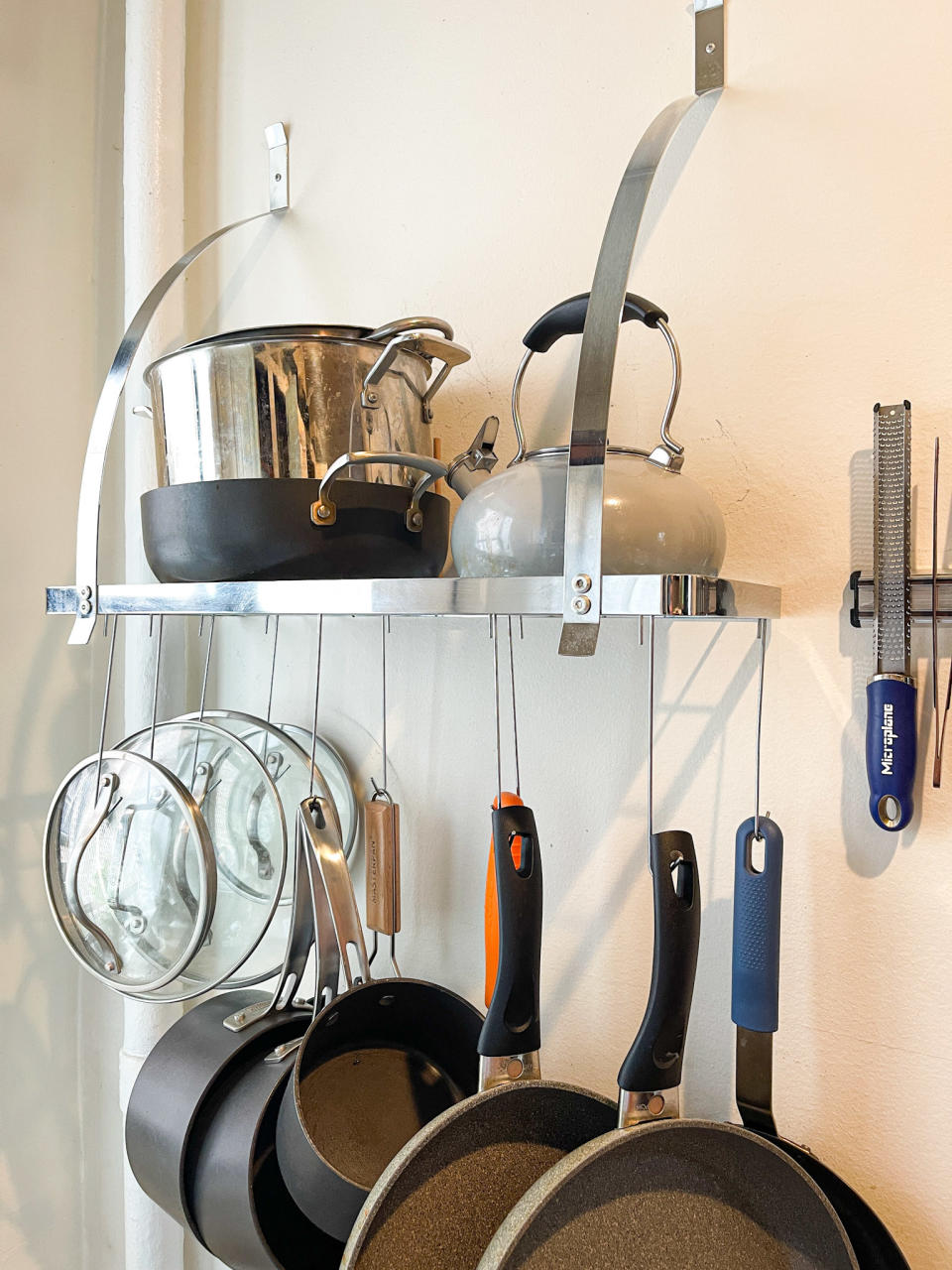
Another wall-mounted product I'd recommend for anyone in a tiny kitchen: a magnetic knife bar. Storing knives can be a bit of a nightmare — knife blocks are huge (and take up more counter space than you probably realize), and throwing a bunch of knives into a drawer is...just dangerous. Wall-mounting a knife strip has allowed me to keep all of my knives as accessible as possible, and I can even hang other metal items on it, too (like my tongs and Microplane). Bonus: since it fits snug against my wall, it has virtually no effect on my working space.
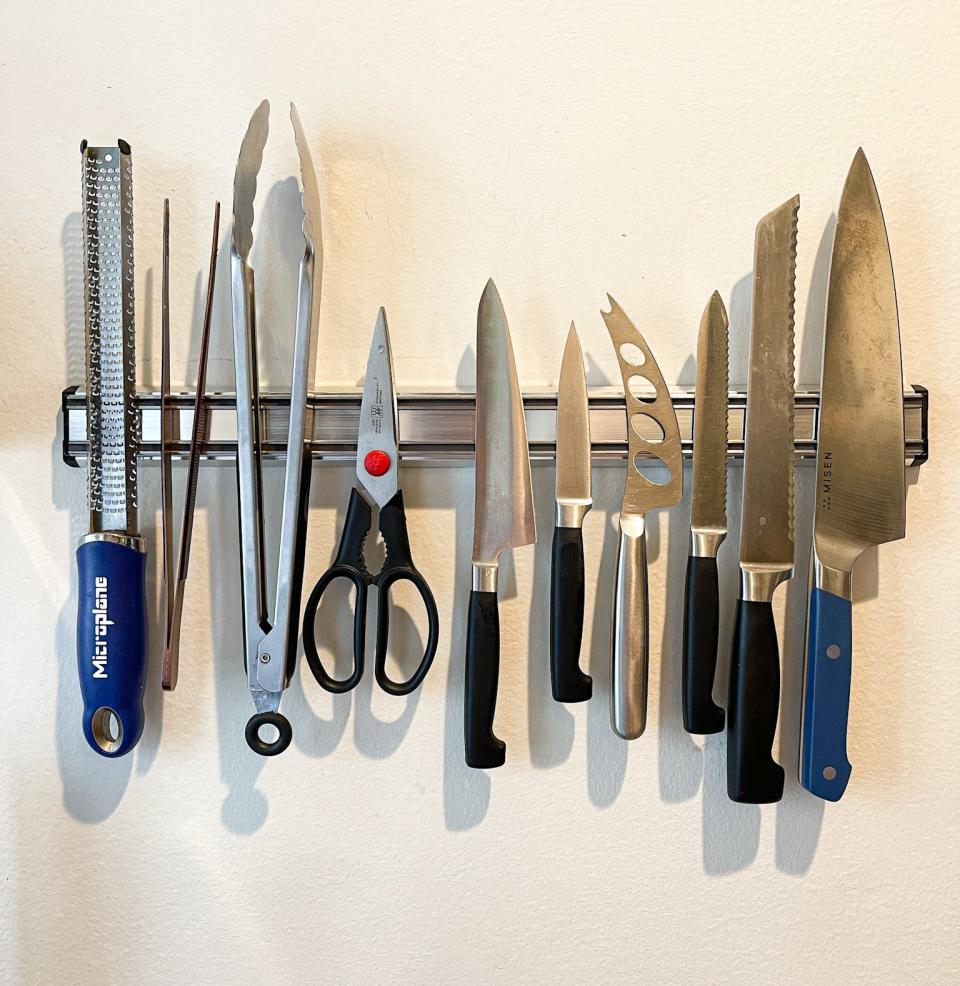
🍳 TIP #10: Figure out a way to make peace with doing dishes, since the only thing worse than washing them in general is having to do it in a tiny space. (Lucky for you, you have multiple options here.)
There's no way around it. Doing the dishes is the absolute worst part of cooking, and I'll double down on that statement if you, like me, are living in a dishwasher-less household. That said, there are a few products and tricks I've acquired over the years that've actually made washing the dishes more bearable...and when dishwashing is bearable, cooking as a whole is more enjoyable.
If you don't have a dishwasher, you probably already know that a dish rack is one of the most crucial components of cleaning up. So if you haven't already, get a dish rack that A) doesn't have a massive footprint, and B) offers multiple tiers of dish-drying space. Those cute bamboo dish racks are...well, cute, but they do! Not! Work! Trust me on this — my dish rack takes up an impossibly tiny amount of counter space, but due to its unique design, I'm always shocked at the amount of dishes it can actually hold.
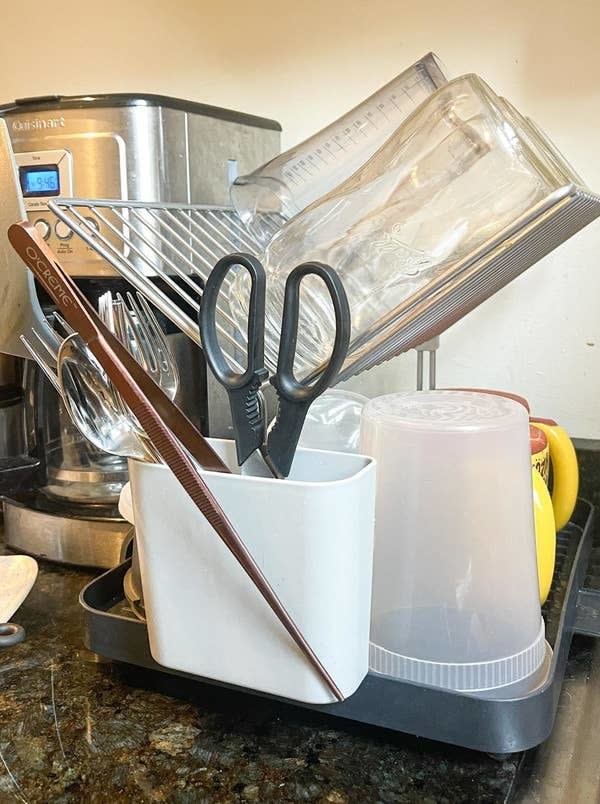
Another indispensable (and very cheap) item in my kitchen: a stow-able dish mat. For years, I'd use kitchen towels to drain any dishes or cookware that wouldn't fit on my dish rack, but after switching to an actual dish mat, drying a large amount of dishes became so much easier. Most are odor-resistant, wildly absorbent, and the best part is the simple fact that you can fold 'em up and store them away after you're done using them. Out of sight, out of mind.


